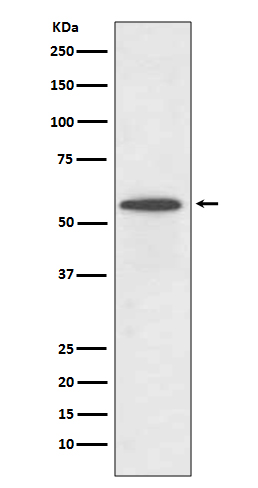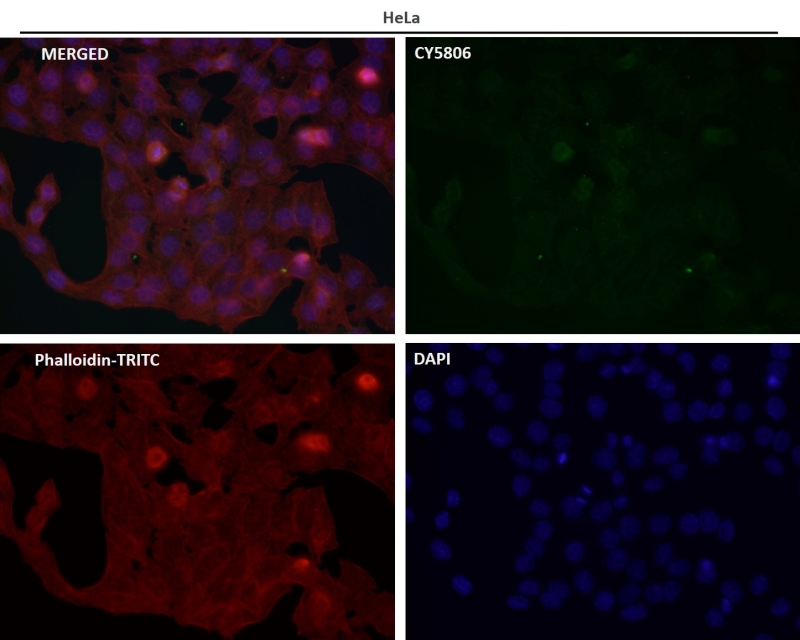


| WB | 1/1000-1/2000 | Human,Mouse,Rat |
| IF | 咨询技术 | Human,Mouse,Rat |
| IHC | IHC:1/100-1/200;IHF:1/50-1/200 | Human,Mouse,Rat |
| ICC | 1/50-1/200 | Human,Mouse,Rat |
| FCM | 1/20-1/100 | Human,Mouse,Rat |
| Elisa | 咨询技术 | Human,Mouse,Rat |
| Aliases | Interferon regulatory factor 5; Interferon regulatory factor 5 bone marrow variant; IRF 5; SLEB10;;Interferon regulatory factor 5 |
| WB Predicted band size | 56 kDa |
| Host/Isotype | Rabbit IgG |
| Antibody Type | Primary antibody |
| Storage | Store at 4°C short term. Aliquot and store at -20°C long term. Avoid freeze/thaw cycles. |
| Species Reactivity | Human |
| Immunogen | A synthesized peptide derived from human Interferon regulatory factor 5 |
| Formulation | Purified antibody in PBS with 0.05% sodium azide,0.05% BSA and 50% glycerol. |
+ +
以下是关于IRF5抗体的3篇参考文献示例(虚构内容,供参考):
1. **文献名称**:*IRF5 Antibodies as Biomarkers in Systemic Lupus Erythematosus*
**作者**:Li, Y. et al.
**摘要**:研究揭示了IRF5自身抗体在系统性红斑狼疮(SLE)患者血清中的高表达,提示其可作为疾病活动度的潜在生物标志物,并关联了IRF5介导的炎症通路异常。
2. **文献名称**:*Targeting IRF5 with Monoclonal Antibodies Attenuates Autoimmune Neuroinflammation*
**作者**:Smith, J.R. et al.
**摘要**:通过开发针对IRF5的单克隆抗体,实验证明其可抑制小鼠多发性硬化模型中促炎因子的释放,为治疗自身免疫性神经炎症提供了新策略。
3. **文献名称**:*Epigenetic Regulation of IRF5 Expression in B Cells by Autoantibodies*
**作者**:Wang, H. & Gonzalez, A.
**摘要**:研究发现类风湿关节炎患者B细胞中IRF5的异常表达与自身抗体导致的DNA甲基化改变相关,揭示了IRF5表观遗传调控的病理机制。
(注:以上文献为示例,实际研究需通过PubMed、Google Scholar等平台检索。)
The Interferon Regulatory Factor 5 (IRF5) is a transcription factor belonging to the IRF family, primarily involved in regulating innate immune responses and inflammatory pathways. It plays a critical role in modulating the expression of type I interferons (IFNs), pro-inflammatory cytokines, and chemokines in response to pathogen-associated molecular patterns (PAMPs) or cellular stress. Dysregulation of IRF5 has been linked to autoimmune diseases, including systemic lupus erythematosus (SLE), rheumatoid arthritis, and Sjögren’s syndrome, where its overexpression correlates with pathogenic inflammation and autoantibody production.
IRF5 antibodies are essential tools for studying its expression, localization, and functional mechanisms. Researchers use these antibodies in techniques like Western blotting, immunohistochemistry, and flow cytometry to detect IRF5 in immune cells (e.g., macrophages, dendritic cells) or tissues. Studies employing IRF5 antibodies have revealed its role in driving M1 macrophage polarization, promoting Th1/Th17 immune responses, and contributing to disease progression in autoimmune and inflammatory conditions. Additionally, IRF5-targeting therapeutic strategies, such as monoclonal antibodies or small-molecule inhibitors, are under exploration to suppress aberrant IRF5 activity. Understanding IRF5's regulatory networks through antibody-based assays continues to advance insights into immune dysregulation and potential treatment avenues.
×